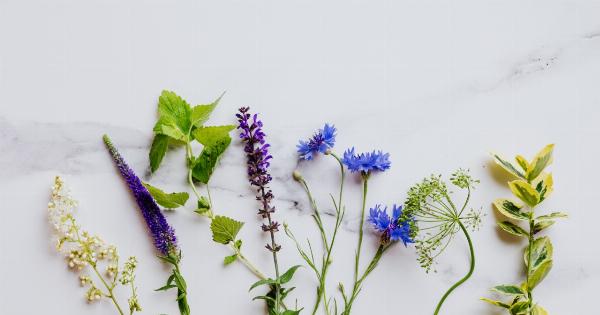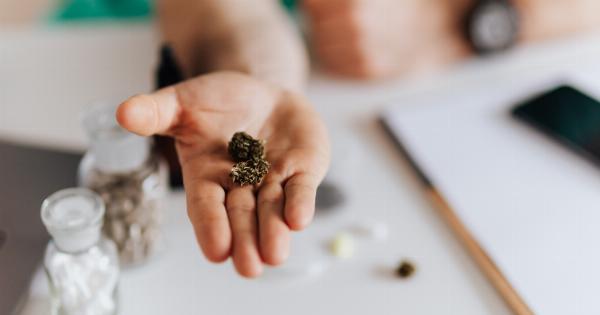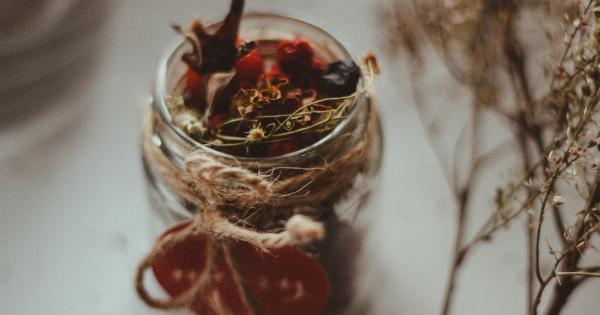Taking prescription medication is often necessary to maintain our health and wellbeing. However, it’s important to be aware of the potential risks associated with combining certain medications and herbs.
Herbal remedies are often viewed as natural and harmless, but they contain active ingredients that can interact with prescription drugs and produce unwanted side effects or interfere with the effectiveness of the medication.
What are some herbs to avoid when taking medication?
If you are currently taking medication, it’s essential to avoid the following herbs:.
1. St. John’s Wort
St. John’s Wort is a herbal supplement commonly used to treat depression and anxiety. However, it can interact with a wide range of prescription medications, including antidepressants, birth control pills, and blood thinners.
When combined with these medications, St. John’s Wort can reduce their effectiveness, cause severe side effects, or even lead to life-threatening conditions. Therefore, if you are taking any medication, it’s crucial to avoid using St.
John’s Wort without consulting with your physician first.
2. Ginkgo Biloba
Ginkgo Biloba is a supplement that is commonly used to improve cognitive function, memory, and circulation. However, it can also interact with various prescription medications, including antidepressants, anti-seizure drugs, and blood thinners.
When combined with these drugs, Ginkgo Biloba can increase the risk of bleeding or interfere with the effectiveness of medication. Therefore, it’s important to avoid using Ginkgo Biloba while taking prescription medication, or consult with your health care provider before using it.
3. Garlic
Garlic is a herb that is often used to improve heart health and lower cholesterol levels. However, it can interact with blood-thinning medications, such as warfarin, and increase the risk of bleeding.
Moreover, consuming garlic may also affect the metabolism and absorption of certain medications, such as antivirals and birth control pills, and reduce their effectiveness. Therefore, if you are taking any prescription medication, it’s essential to consult with your physician before consuming garlic supplements.
4. Kava
Kava is a natural remedy commonly used to treat anxiety and insomnia. However, it can interact with prescription medications, such as benzodiazepines and alcohol, and cause severe side effects, such as liver damage and impaired coordination.
Therefore, it’s essential to avoid using Kava if you are taking any prescription medication or consult with your health care provider before using it.
5. Echinacea
Echinacea is a herb commonly used to boost immunity and treat colds and flu. However, it can interact with immunosuppressive drugs, such as cyclosporine, and reduce their effectiveness.
Moreover, using Echinacea supplements for an extended period may also cause liver inflammation and allergic reactions. Therefore, it’s crucial to avoid using Echinacea while taking prescription medication or consult with your physician before using it.
6. Saw Palmetto
Saw Palmetto is a herbal supplement commonly used to treat BPH (benign prostatic hyperplasia) in men. However, it can interact with blood-thinning medications and increase the risk of bleeding.
Moreover, using Saw Palmetto supplements may also affect the absorption and effectiveness of hormone therapies. Therefore, it’s essential to avoid using Saw Palmetto while taking prescription medication or consult with your health care provider before using it.
7. Milk Thistle
Milk Thistle is a herb used to treat liver disorders and improve liver function. However, it can interact with various drugs, including chemotherapy drugs, immunosuppressive drugs, and anti-seizure medications.
Milk Thistle may reduce the effectiveness of these medications, causing potentially harmful side effects. Therefore, it’s essential to consult with your physician before using Milk Thistle while taking any prescription medication.
8. Ginseng
Ginseng is a herb commonly used to boost energy, cognition, and immune function. However, it can interact with various medications, including blood thinners, diabetes medications, and antidepressants.
Ginseng may increase the risk of bleeding or reduce the effectiveness of prescription medication, causing severe side effects. Therefore, it’s crucial to avoid using Ginseng while taking prescription medication or consult with your physician before using it.
9. Grapefruit
Grapefruit is a citrus fruit that can interact with various medications, including blood pressure medications, statins, and immunosuppressant drugs.
Grapefruit contains compounds that can interfere with the metabolism and absorption of medication, increasing the risk of side effects. Therefore, it’s essential to avoid consuming grapefruit products while taking prescription medication or consult with your health care provider before doing so.
10. Valerian
Valerian is a herb commonly used to treat anxiety and insomnia. However, it can interact with prescription medications, including benzodiazepines, antihistamines, and narcotics.
When combined with these drugs, Valerian can enhance their sedative effects, causing severe drowsiness and impaired motor function. Therefore, it’s crucial to avoid using Valerian while taking prescription medication or consult with your physician before using it.
Conclusion
While herbs are often viewed as natural and safe, they can interact with prescription medications and cause unwanted side effects.
Therefore, if you are currently taking medication, it’s essential to consult with your physician before using any herbal remedies. Your health care provider can best advise you on the potential risks and benefits associated with combining prescription medication and herbs, ensuring your safety and well-being.






























